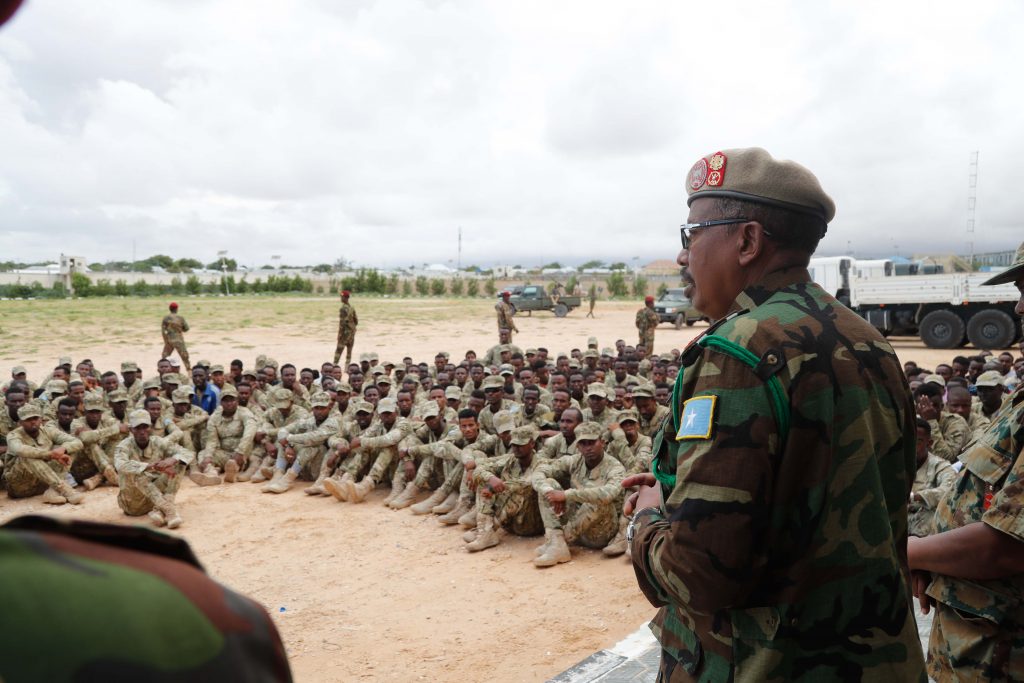Failure by Security Council to meet detrimental to Security Architecture implementation

By T. Roble
The move by the federal member states to boycott the upcoming National Security Council (NSC) calling for third party intervention casts doubt on the actualization of the National Security Architecture whose fate largely lies on the political will and drive by the NSC.
The National Security Council which is chaired by President Mohamed Farmaajo and draws membership from federal state leaders is a critical component of the National Security Architecture (NSA) approved by Parliament and endorsed by international donors during the London Conference last May.
The NSA which forms part of the Security Pact agreed to by donors in London Conference envisages the creation and restructuring of the Somali National Army, the Somali Police Forces, Special Forces and the Paramilitary Unit (Daraawish). The Architecture defines the manner and form in which these disciplined forces are to be distributed within Federal and State levels in addition to establishing mandate and leadership framework.
Accordingly, the army would be 22,000 strong inclusive of 4,000 Special Forces while the police which shall be distributed between the federal and state governments would be composed of 32,000 officers.
Overall, the NSA is geared towards building a professional, strong and effective Somali Security Force which can gradually and ultimately take over from the African Union force, Amisom. As the senior-most organ mandated with undertaking critical decisions directly impacting on the security sector, the Council’s proper and cohesive functioning can therefore not be overemphasized.
WORRISOME
In declaring their severance of ties with the federal government last week, the federal states accused Farmaajo’s administration of failing to make meaningful progress to curtail Al-Shabaab attacks especially along main supply routes. They also lamented the federal government’s failure to recognise and support the role of the paramilitary unit (daraawish) and regional special police units.
Outgoing UN head in Somalia Michael Keating told the UN Security Council Thursday the lack of trust between the two levels of government and the decision by the states to cut cooperation ‘is worrisome’.
Keating’s remarks which summed up his two year stint as head of the UN Assistance Mission in Somalia paint an optimistic but fragile state of affairs in Somalia. It highlights institutional weakness and chronic absence of continuity which has subjected Somalia’s recovery process into an individual-centric instead of an institutionally anchored process.
This argument lends credence to the call for third party intervention by the federal states in their engagement with the federal government. That the federal member states cannot not trust the federal government to actualize agreements points to failure to invest in institutions which compel state officers to act in accordance with the provisions of law and not out of personal convenience or political expedience.
SOFT SPOTS
As the two levels of government engage in endless wrangles, the circus feeds and emboldens Al-Shabaab and all other extremist and criminal networks in the country. The bickering in the top echelons of the state exposes the country’s security vulnerabilities to Al-Shabaab which has been very keen at studying and exploiting soft spots in Somalia.
Whereas ‘Somali-led-Somali-driven’ calls have dominated every recovery initiative, the demand for third party intervention by the state presidents is not only confusing but farcical. This is not to dismiss their concerns over failures on the part of the federal government. It is not lost on any an observer that mandarins in the federal government have determinedly worked to remove some state presidents and even sponsored motions in state parliaments.
It is however that Somalia cannot afford another decade of turmoil where international actors have to shepherd every process as leaders launch in hotels in Mogadishu and other capitals of the world waiting for things to be fixed. Both President Farmaajo and the five state leaders must put their differences aside for the interests of this nation. They must know that there is no other way Somalia can get out of this rut other than face the realities of the day.
Failure by the National Security Council to meet and deliberate on the country’s most pressing concern-security, is a boon for Al-Shabaab and many other years of foreign tutelage, if it will by any chance be forthcoming.